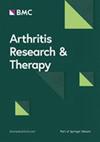Disease activity and treatment response in early rheumatoid arthritis: an exploratory metabolomic profiling in the NORD-STAR cohort
IF 4.6
2区 医学
Q1 Medicine
引用次数: 0
Abstract
The variability in treatment response in people with rheumatoid arthritis (RA) warrants the prediction of patients at high risk of treatment failure. Identification of biomarkers linked to clinical remission in RA is currently a challenge. Metabolomics may help to identify such biomarkers as it allows for a comprehensive exploration of disease-related variations that extends beyond the genome and proteome. This hypothesis-free exploratory metabolomics study aimed to profile serum metabolic alterations in early RA to understand the metabolic changes associated with disease activity and therapeutic response. The study included 220 early RA participants from the NORD-STAR study, randomized at baseline into four arms, ranging from conventional anti-rheumatic treatment to biological drugs: methotrexate combined with prednisolone (1), certolizumab (2), abatacept (3), or tocilizumab (4). Untargeted metabolomics was performed in serum samples at baseline and 24-week follow-up. Participants achieving clinical disease activity index remission at 24 weeks were defined as responders. Machine learning models for treatment response were constructed using random forest, logistic regression, support vector machine and extreme gradient boosting algorithms based on selected features. We identified 278 metabolites, of which 39 were associated with baseline disease activity, including several acylcarnitines and amino acids. We also found 17 baseline metabolites associated with remission at 24 weeks in the overall cohort, including malic acid (β=-0.4), cytidine (β = 0.4), arginine (β = 0.3), and citrulline (β = 0.2), as well as specific metabolites and metabolic pathways associated with remission in the four treatment arms. Fifteen features were identified using machine learning-based multivariable selection. The best predictive model using logistic regression achieved AUC of 0.75 in training and 0.73 in the test set. Our study has identified several baseline metabolites and metabolic pathways associated with disease activity and response to different treatments in early RA. By integrating metabolomics and clinical data, we developed predictive models for response to treatment in early RA, though their predictive performance remains limited.早期类风湿关节炎的疾病活动性和治疗反应:NORD-STAR队列的探索性代谢组学分析
类风湿关节炎(RA)患者治疗反应的可变性保证了对治疗失败高风险患者的预测。识别与RA临床缓解相关的生物标志物目前是一个挑战。代谢组学可能有助于识别这些生物标志物,因为它允许对超出基因组和蛋白质组的疾病相关变异进行全面探索。这项无假设的探索性代谢组学研究旨在分析早期RA的血清代谢变化,以了解与疾病活动性和治疗反应相关的代谢变化。该研究包括来自NORD-STAR研究的220名早期RA参与者,在基线时随机分为四组,从常规抗风湿病治疗到生物药物:甲氨蝶呤联合强的松龙(1)、certolizumab(2)、abatacept(3)或tocilizumab(4)。在基线和24周随访时对血清样本进行非靶向代谢组学研究。在24周达到临床疾病活动指数缓解的参与者被定义为应答者。使用随机森林、逻辑回归、支持向量机和基于选定特征的极端梯度增强算法构建治疗响应的机器学习模型。我们鉴定了278种代谢物,其中39种与基线疾病活动相关,包括几种酰基肉碱和氨基酸。在整个队列中,我们还发现了17种与24周缓解相关的基线代谢物,包括苹果酸(β=-0.4)、胞苷(β= 0.4)、精氨酸(β= 0.3)和瓜氨酸(β= 0.2),以及与四个治疗组缓解相关的特定代谢物和代谢途径。使用基于机器学习的多变量选择确定了15个特征。使用逻辑回归的最佳预测模型在训练集的AUC为0.75,在测试集的AUC为0.73。我们的研究已经确定了几种基线代谢物和代谢途径与早期RA的疾病活动性和对不同治疗的反应相关。通过整合代谢组学和临床数据,我们建立了早期RA治疗反应的预测模型,尽管它们的预测性能仍然有限。
本文章由计算机程序翻译,如有差异,请以英文原文为准。
求助全文
约1分钟内获得全文
求助全文
来源期刊

Arthritis Research & Therapy
RHEUMATOLOGY-
CiteScore
8.60
自引率
2.00%
发文量
261
审稿时长
14 weeks
期刊介绍:
Established in 1999, Arthritis Research and Therapy is an international, open access, peer-reviewed journal, publishing original articles in the area of musculoskeletal research and therapy as well as, reviews, commentaries and reports. A major focus of the journal is on the immunologic processes leading to inflammation, damage and repair as they relate to autoimmune rheumatic and musculoskeletal conditions, and which inform the translation of this knowledge into advances in clinical care. Original basic, translational and clinical research is considered for publication along with results of early and late phase therapeutic trials, especially as they pertain to the underpinning science that informs clinical observations in interventional studies.
 求助内容:
求助内容: 应助结果提醒方式:
应助结果提醒方式:


